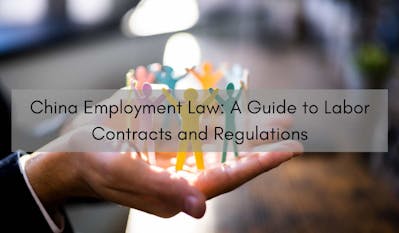China has implemented a comprehensive social welfare system that requires all Chinese and foreign employees working in the country to contribute to social security.
Employers shall make contributions toward various types of insurance for their staff, while contractors and self-employed individuals have the option to contribute independently. Contribution types and rates differ by city, making compliance a complex task.
China’s Social Security: Overview
The Chinese social security system covers many sectors, including pensions, healthcare, and social insurance.
Types of Social Security Coverage in China
China’s social security system covers five primary types of insurance and one mandatory housing fund:
- Pension Insurance
- Medical Insurance
- Unemployment Insurance
- Work-Related Injury Insurance
- Maternity Insurance
- Housing Fund
In some areas, like Shanghai, maternity insurance and medical insurance have been merged, reducing the total number of insurance plans to four (excluding housing fund).
Employers and employees both contribute to pension, medical insurance, unemployment insurance, and the housing fund.
Meanwhile, employers are solely responsible for contributions to work-related injury and maternity insurance.
Social Security Contribution Rates in China
The contribution rates for social security schemes vary by city, with specific rates determined based on local regulations. Below is an overview of the typical contribution rates for employers and employees:
| Benefit | Employer Contribution Rate | Employee Contribution Rate |
|---|---|---|
| Pension | 14% – 16% | 8% |
| Medical Expenses | 8.5% – 10% | 2% |
| Unemployment | 0.5% – 0.8% | 0.2% – 0.5% |
| Maternity | 0.8% – 1% | N/A |
| Work-Related Injuries | 0.5% – 2% | N/A |
| Housing Fund (Residents Only) | 5% – 12% | 5% – 12% |
When evaluating a job offer in China, remember that the monthly or annual salary is usually expressed as a gross amount (before taxes and social contributions). It is important to consider this carefully, as social contributions in China may be high.
Contribution Base Calculation
The contribution base is assessed on the employee's average income from the previous calendar year (January to December). The formula is as follows:
Social Security contribution base = Total income of the previous year / 12
The contribution basis for new employees is calculated using their first full month's pay in the year they start working.
There are floors and ceilings to social security contributions. The local minimum wage or a percentage of the average local wage is used to define the minimum base. In contrast, the maximum base is usually set at three times the average local salary. Businesses must stay informed since local governments update these figures annually, and the timing of those updates might differ between cities and regions.
The average salary for the following cities in 2023 is as follows:
- Shanghai: RMB 12,307
- Beijing: RMB 11,761
- Guangzhou: RMB 13,193
- Wuhan: RMB 9,178
- Shenzhen: RMB 14,553
- Hangzhou: RMB 13,177
For example, in Shanghai, where the average salary is RMB XXX, the maximum monthly contribution base would be RMB XXX (three times the average salary), and the minimum base would be RMB XXX (60% of the average salary).
| Contribution Type | Employer Contribution | Employee Contribution |
|---|---|---|
| Pension (16% of contribution base) | RMB 480 | RMB 240 (8%) |
| Medical Insurance (10%) | RMB 300 | RMB 60 (2%) |
| Unemployment Insurance (0.5%) | RMB 15 | RMB 15 (0.5%) |
| Work-Injury Insurance (0.256%) | RMB 8 | N/A |
| Housing Fund (7%) | RMB 210 | RMB 210 (7%) |
| Total | RMB 1,013 (34% of base) | RMB 525 (17% of base) |
Total of employer and employee contribution = (51% of the contribution base and 32% of the gross salary)
The range of the work-injury insurance percentage is 0.2% to 1.9%, depending on the scope of the employer's business.
Contributions to the housing fund typically fall between 5% and 7%, with 7% serving as the highest required amount (in Shanghai, most of the companies opt for xxx). Employers can voluntarily increase this contribution by 5%, and this applies to both the employer and employee contributions.
Employers are responsible for accurately calculating and deducting their contributions and employees' contributions. Pre-tax contributions are deducted from employees' salaries, and the employer's overall expenses consist of the employee's gross income and share of Social Security payments.
In China, annual tax payments may be adjusted at the end of the year to align with contributions made to the social security system. This reconciliation ensures accurate tax calculations based on actual income and social security payments, so it's essential to keep thorough records of both throughout the year.
Key Employer Obligations in China

To guarantee compliance, upon hiring a new employee, employers shall follow the following steps:
Employee Registration
Employers must register new employees with the local Housing Fund Bureau and Social Insurance Bureau before they can create or activate their Social Security accounts.
There are specific timelines for transferring the social contribution account from the previous employer to the new employer. The transfer of the social security account shall be done with the assistance of the previous employer to ensure all information about the employee is correct.
Calculate and Withhold Contributions
Employers are responsible for appropriately calculating and deducting contributions on behalf of both employers and employees, even though both parties contribute to the social security system.
Contributions are directly deducted before payment of the monthly salary is made by the employer.
Timely Payments
Employers shall make Social Security contributions on time. Late payments may lead to fines, and labor disputes may become expensive if contributions are not made.
When selling a company, the most common issue results from the payment of social contributions. Companies willing to sell their equity interest shall be all the more careful as this will impact the company's valuation.
No Agreement-Based Exemptions
Even if both parties agree, employers cannot use agreements with employees to avoid paying contributions or to lower contribution amounts. Courts declare such agreements to be unlawful, and they may be punished with additional severance costs or repayment of contributions that were avoided.
Avoiding Violations
Repeated violations or non-compliance may result in the company being placed on an HR "name and shame" list, harming its reputation and hindering potential recruitment attempts.
Risks of Non-Compliance
Employers who try to cut expenses by avoiding or reducing social security contributions may face legal problems. In these situations, courts usually side with employees, ordering employers to pay up missed contributions and possibly offering additional compensation.
Maintaining compliance is crucial for foreign businesses in order to avoid fines and damage to their reputation.
Impact of the Social Security System for Foreigners
Since 2011, foreign employees in China have been required to participate in the social insurance system under the Interim Measures for the Participation in Social Insurance of Foreigners Employed in China.
Contribution requirements vary by city due to regional management of social security.
Foreigners from countries with social insurance exemption agreements with China can be exempted from certain contributions.

China has implemented agreements with 12 countries, including:
- Germany
- South Korea
- Denmark
- Canada
- Finland
- Switzerland
- Netherlands
- Spain
- Luxembourg
- Japan
- Serbia
- France (pending implementation)
The scope and conditions of exemptions differ by agreement and are subject to local policies. Employers must verify requirements with the local Social Insurance Bureau before opting out for foreign staff.
Expats are generally not required to contribute to the housing fund scheme. Many cities allow voluntary housing fund contributions to attract foreign talent.





